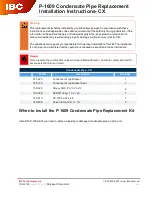
6 / 136
00RNO0333-B (U0625869)
EVO S -
Installation and Servicing
1.4.
Safety instructions
•
Always switch the boiler off and shut off the general gas supply before
carrying out any work on the boiler.
•
After performing work on the boiler (maintenance or breakdown), check
that there are no gas leaks from the installation.
DANGER:
If you smell gas:
•
Do not use a naked flame, do not smoke, do not turn on electrical
contacts or switches.
•
Cut off the gas supply.
• Air the premises.
•
Look for the leak and repair it.
DANGER:
If you see smoke:
•
Switch off the boiler.
• Air the premises.
•
Look for the leak and repair it.
DANGER:
This boiler's earth bonding is ensured with connecting cables (green/
yellow) and specific attachment screws. During any dismantling work,
make sure you reconnect the cables concerned; it is IMPERATIVE to
reuse the original attachment screws.
1.5. Water characteristics
The following rules apply as soon as the boiler is commissioned and remain
valid until the product’s end-of-life.
DANGER:
It is forbidden to use water containing glycol.
1.5.1. Preparation of the water circuit before commissioning the boiler
For all installation work (new or renovation), the water network pipes must be
meticulously cleaned. The purpose of cleaning prior to commissioning is to
remove germs and residues which are the cause of deposits.
In new installations in particular, residue from grease, oxidised metal and
even copper micro deposits must be removed.
In renovated installations, cleaning should focus on removing sludge and the
products of corrosion formed when the unit was last in operation.
There are two types of methods for cleaning and removing sludge: a high
intensity approach that takes a few hours and a slower, more gradual
approach that takes several weeks. This first type of cleaning must be done
before connecting the new boiler, and with the second type, a filter should be
installed on the back of the boiler to capture loosened deposits.
Cleaning prior to commissioning helps to improve the equipment’s
performance, reduce energy consumption and fight against scaling and
corrosion. This operation must be done by a professional (water treatment).







































